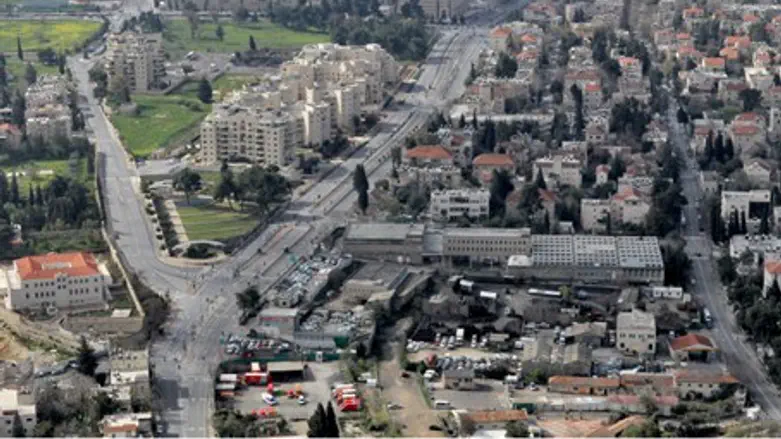
Prime Minister Binyamin Netanyahu's win surprised the world, both given his unexpected reversal of electoral fortunes, as well as his declaration of opposition to a Palestinian state. Despite his perhaps predictable clarification today, he has given a platform to examine alternatives to the Two-State Solution.
One of the alternative plans is the "Palestinian Emirates," the brainchild of Dr. Mordechai Kedar of the Begin-Sadat Center for Strategic Studies, who told Arutz Sheva the plan would be a more appropriate political arrangement for the seven Arab cities in Judea and Samaria.
"The creation of an artificial Palestinian state requiring the uprooting of Jewish families where no Arab population currently exists would lead to indefensible borders for the Jewish homeland,” says Kedar on his website.
He also denies the argument that the populations can be moved, claiming "today Arabs live within the state of Israel and in Gaza, Judea and Samaria. These Arab population centers are not going away and neither is the State of Israel.”
In some ways it works with the model of the 1993 Oslo Accords' area system, but in some fundamental ways it differs.
While Area A of the Accords mainly composes the major Arab cities – Jenin, Shechem (Nablus), Ramallah, Jericho, Tulkarm, Kalkilya, an the Arab part of Hevron – that Dr. Kedar proposes become the seven (or eight when including Gaza) independent Palestinian emirates, the borders are not set in stone.
More importantly, the crux of the proposal is to remove the Palestinian Authority (PA) and reinvest control over local Arab affairs to the strong clans who are living in each area.
Dr. Kedar describes a situation in the Palestinian Arab areas that is a microcosm of the divisions seen in other parts of the Arab world. While it might be more noticeable in certain countries because divisions are along ethnic or religious lines, tribal or clan divisions should not be overlooked among Palestinian Arabs.
"There are different clans dominant in each city: the Erekats in Jericho, the Barghoutis in Ramallah, the Jabaris in Hevron, the Masris in Shechem," he notes.
Those are only a few examples. But the common thread among them is that they are often at odds with the elite in the Palestinian Authority, many who came from families not in Judea and Samaria or had been with Yasser Arafat in Lebanon or Tunisia before appointing themselves heads of the PA after the Oslo Accords.
"Palestinian identity is as weak as any other artificial or superficial Arab nation-state's identity. People are still more loyal to the tribe or the clan or sectarian groups. This is the major failure of all states across Middle East, nor is it any different among anyone else in the Arab World."
The city-states would not have territorial contiguity between them. The roads that connect the cities would still fall under the administration of Israel's security forces. When asked if this could pose problems for these emirates economically, Dr. Kedar explained why he thought it would not.
Kedar noted "size has nothing to do with economy. On the contrary, big countries fragment socially and are economically more stratified."
He pointed to small city-states in Europe that are extremely prosperous, particularly San Marino. If one looked elsewhere in the world, Singapore and the semi-autonomous Hong Kong come up.
The situation would still be very similar to the United Arab Emirates (UAE) in the Persian Gulf, he notes, even while saying "you can't create stability with money but stability creates wealth, which is what you have in the UAE and Qatar."
"Social stability creates political viability for a state, and with that a functioning political arena" that allow a state to "have good economy."
In contrast to the smaller sovereign areas of the Persian Gulf, the much larger Iraq is a cesspool for civil war among clans of Sunni and Shi'ite clans. That environment stops once you hit the Kurdish-majority areas, where the only semblance of civil war in the mid-1990s was political rather than tribal and short-lived in any case.
Another wildcard to the viability of this idea is the Palestinian Arabs themselves of course. Dr. Kedar does not dismiss the possibility that the Palestinian Authority could face revolt from organized clans in each city, and the PA will find itself in the same situation as Syria, Iraq, Libya and Yemen.
"The Palestinian Authority does fear the tribes' ability to unite against PLO (Palestine Liberation Organization) rule. On the other hand, the tribes can resist the dictators of the Authority."
When asked if he thought certain cities might be better suited, or more immediately suitable, for this type of city-state, he answered: Hevron.
"Bethlehem is a problem because of the dwindling Christian population which has been pushed out by neighboring Bedouin clans," says Kedar, who weighs the possibility a significant Christian minority in Bethlehem might make it a candidate for independence from the Palestinian Authority.
Yet, he says these issues make it “too fragmented” to be a viable starter as an emirate right now.
"Christians should be let back into their city after being pushed out, but the PA doesn't care about them," he argues.